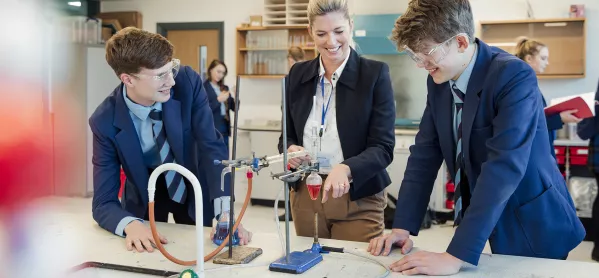Nearly one in three (30 per cent) of science teachers in English secondary schools are planning on leaving their role within the next five years, research has found.
And nearly two-thirds (64 per cent) of state secondaries report being understaffed in at least one of the three sciences, according to a Royal Society of Chemistry (RSC) survey of more than 3,700 UK science teachers and technicians.
In England specifically, half of the respondents (50 per cent) reported being understaffed in physics, with 32 per cent saying they had insufficient chemistry teachers.
UK-wide, nearly one in five science teachers (18 per cent) at state secondary schools plan to leave the profession within five years for reasons other than retirement, with high workload, stress and exhaustion highlighted as the main issues.
The RSC report also found that a lack of science technicians was reported by more than 40 per cent of schools in England, Scotland and Wales, hindering students’ access to regular practical work.
Science technicians provide “vital support to the teaching of practicals, delivering greater context and engagement for learners”, the RSC said.
And it says its analysis shows that schools rated as “outstanding” by Ofsted had an average of three science technicians, while those rated “requires improvement” had 1.9 on average.
The RSC’s report, The Science Teaching Survey 2022, also raises teachers’ concerns about the science curriculum.
In England, 73 per cent of teachers said there was “too much content” to teach in the time available, while 68 per cent said it was too demanding for students to access, for example for those with lower attainment or additional needs. Nearly half (48 per cent) said it was difficult to find time for planning.
Delwen McCallum, RSC programme manager for education, told Tes the situation was a “vicious cycle”.
She said: “We have teachers with a workload that’s too high, teaching out of specialism, which is increasing their workload.”
This means they are leaving their jobs, exacerbating the pressure on the remaining staff, she added.
The focus needed to be on retention, and making teaching “a much more appealing, competitive career to the other science, technology, engineering and maths (Stem) careers that are available” - such as by increasing access to professional development, she said.
But, she added, there was a need for “real data around exactly who is teaching, what, where and whether they are specialists or not”, in order to help “make evidence-based recommendations and decisions to really influence change”.
Ms McCallum also added that the lack of specialist teachers had an impact on school students suffering from a “lack of continuity” and “perhaps a lack of readiness”.
Last year, the Institute of Physics warned that a shortage of physics teachers needed to be “addressed urgently” to avoid the problem becoming “compounded”.
And a report in the summer warned that proposed changes to teacher pay were unlikely to solve teacher supply shortages, particularly in Stem subjects.





